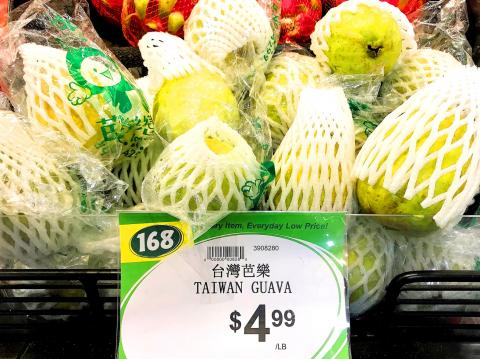The first shipment of Taiwanese guavas to the US has arrived after more than 20 days at sea, an event that was celebrated on Wednesday by Taiwan’s representative office in Los Angeles.
The guavas were shipped from Tainan on Dec. 27 last year, following the signing of an export agreement by the two countries in October. With the shipment of the 13 metric tonnes of guavas to Los Angeles, Taiwan became only the second country in the world to supply the fruit to the US, after Mexico.
The arrival of the shipment was marked with a ceremony organized by the Taipei Economic and Cultural Office in Los Angeles.

Photo: CNA
At the ceremony, US Representative Judy Chu (趙美心) said the US’ importation of guavas from Taiwan was a “great step forward” for trade relations between the two sides.
“The value of our partnership with Taiwan cannot be understated,” Chu said, adding that Taiwan is the US’ 11th-largest trade partner, while the US is Taiwan’s largest foreign investor.
She said the “fabulous” guavas were one of the most memorable experiences she had during a summer spent in Taiwan when she was a college student.
Also speaking at the event, Andrew Edlefsen, an officer at the US’ Foreign Commercial Service, said bilateral trade between the US and Taiwan totaled US$95 billion in 2018 and will continue to grow.
“I am very happy to see this trade relationship with Taiwan move forward and to see what the future brings,” he said.
Edlefsen also said guavas were his favorite fruit when he lived in Taiwan for five years.
Franz Gehrig, an official with the Consulate General of Switzerland in Los Angeles, said he was impressed when he learned that Taiwan was not just an exporter of high-tech products, but also had a vibrant agricultural sector.
“We hope that in the future, there will also be guavas going to Switzerland from Taiwan,” Gehrig said.
In addition to guavas, Taiwan also exports lychees, carambolas, longans and mangoes to the US, according to Lin Li-fang (林麗芳), head of the agricultural division at Taipei’s representative office in Washington.
The first shipment of guavas, which had to be refrigerated during the trip to avoid fruit fly infestation, will be distributed to supermarkets on the US west coast, Lin said.

Vincent Wei led fellow Singaporean farmers around an empty Malaysian plot, laying out plans for a greenhouse and rows of leafy vegetables. What he pitched was not just space for crops, but a lifeline for growers struggling to make ends meet in a city-state with high prices and little vacant land. The future agriculture hub is part of a joint special economic zone launched last year by the two neighbors, expected to cost US$123 million and produce 10,000 tonnes of fresh produce annually. It is attracting Singaporean farmers with promises of cheaper land, labor and energy just over the border.

US actor Matthew McConaughey has filed recordings of his image and voice with US patent authorities to protect them from unauthorized usage by artificial intelligence (AI) platforms, a representative said earlier this week. Several video clips and audio recordings were registered by the commercial arm of the Just Keep Livin’ Foundation, a non-profit created by the Oscar-winning actor and his wife, Camila, according to the US Patent and Trademark Office database. Many artists are increasingly concerned about the uncontrolled use of their image via generative AI since the rollout of ChatGPT and other AI-powered tools. Several US states have adopted

A proposed billionaires’ tax in California has ignited a political uproar in Silicon Valley, with tech titans threatening to leave the state while California Governor Gavin Newsom of the Democratic Party maneuvers to defeat a levy that he fears would lead to an exodus of wealth. A technology mecca, California has more billionaires than any other US state — a few hundred, by some estimates. About half its personal income tax revenue, a financial backbone in the nearly US$350 billion budget, comes from the top 1 percent of earners. A large healthcare union is attempting to place a proposal before

KEEPING UP: The acquisition of a cleanroom in Taiwan would enable Micron to increase production in a market where demand continues to outpace supply, a Micron official said Micron Technology Inc has signed a letter of intent to buy a fabrication site in Taiwan from Powerchip Semiconductor Manufacturing Corp (力積電) for US$1.8 billion to expand its production of memory chips. Micron would take control of the P5 site in Miaoli County’s Tongluo Township (銅鑼) and plans to ramp up DRAM production in phases after the transaction closes in the second quarter, the company said in a statement on Saturday. The acquisition includes an existing 12 inch fab cleanroom of 27,871m2 and would further position Micron to address growing global demand for memory solutions, the company said. Micron expects the transaction to